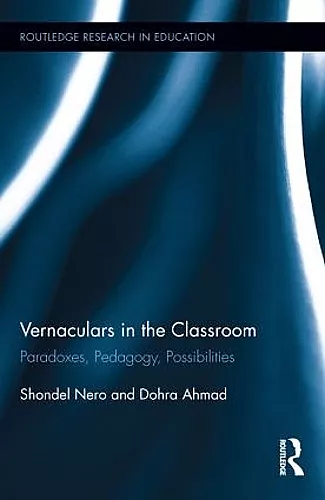Vernaculars in the Classroom
Paradoxes, Pedagogy, Possibilities
Dohra Ahmad author Shondel Nero author
Format:Hardback
Publisher:Taylor & Francis Ltd
Published:10th Jun '14
Currently unavailable, and unfortunately no date known when it will be back
This hardback is available in another edition too:
- Paperback£38.99(9781138286818)

This book draws on applied linguistics and literary studies to offer concrete means of engaging with vernacular language and literature in secondary and college classrooms. The authors embrace a language-as-resource orientation, countering the popular narrative of vernaculars as problems in schools. The book is divided into two parts, with the first half of the book providing linguistic and pedagogical background, and the second half offering literary case studies for teaching. Part I examines the historical and continued devaluing of vernaculars in schools, incorporating clear, usable explanations of relevant theories. This section also outlines the central myths and paradoxes surrounding vernacular languages and literatures, includes productive ways for teachers to address those myths and paradoxes, and explores challenges and possibilities for vernacular language pedagogy.
In Part II, the authors provide pedagogical case studies using literary texts written in vernacular Englishes from around the world. Each chapter examines a vernacular-related topic, and concludes with discussion questions and writing assignments; an appendix contains the poems and short stories discussed, and other teaching resources. The book provides a model of interdisciplinary inquiry that can be beneficial to scholars and practitioners in composition, literature, and applied linguistics, as well as students of all linguistic backgrounds.
"This is a much needed publication that translates current scholarly realizations about global English for instructional purposes." -- Suresh Canagarajah, Pennsylvania State University, USA
"Nero and Ahmad show that there is no conflict between using vernacular and so-called standard English in the classroom. Indeed, the authors explicitly ask for teaching that helps students master "standard" written English, while still inviting them to write often in the vernacular. This is an important and valuable book."-- Peter Elbow, University of Massachusetts, USA
"This book offers a fresh and exciting new look at vernacular Englishes from the perspective of literary studies and of vernacular literary texts from the perspective of applied linguistics. Deftly addressing questions of both language and literature, it provides an invaluable synthesis of disciplinary paradigms, with urgent implications for how we read and teach vernacular texts from around the world." -- Jahan Ramazani, University of Virginia, USA
"This is a book that demonstrates the intellectual, creative, and cultural benefits of engaging the vernacular in the classroom, rather than outlawing or ignoring it. Among the many virtues of this innovative book is that it combines linguistics and literature, theory and application. The pedagogical case studies, virtually ready for classroom use, are especially valuable."-- John Rickford, Stanford University, USA
"This pioneering, visionary work reflects the curricular innovations and pedagogical strategies that these two gifted scholar-teachers have developed over the years and tested in the crucible of the classroom. At long last, the language-literature paradigm is shifting, and Nero and Ahmad’s Vernaculars in the Classroom is leading the way. Go head wit yall bad self!"-- Geneva Smitherman, Michigan State University, USA
"Nero and Ahmad’s brilliant book shows us that vernacular language is a powerful tool that not only expresses meaning as fully as any "standard" language, but authenticates its speakers and creates sophisticated stylistic effects." -- Sandra Wilde, Hunter College, USA
"Vernaculars in the Classroom: Paradoxes, Pedagogy, Possibilities, by Shondel Nero and Dohra Ahmad, represents a unique instance of interdisciplinary research. The two authors, a linguist and a scholar of literature, unite their experiences and interests in vernacular expression to create an invaluable resource that exposes the myths and paradoxes that permeate the use of vernacular languages in schools. Concurrently, it offers answers and practical strategies for teachers to critically engage vernaculars in knowledge construction."– Maria Cecilia Schwedhelm, Language and Education Journal, 2016
ISBN: 9780415815512
Dimensions: unknown
Weight: 430g
228 pages